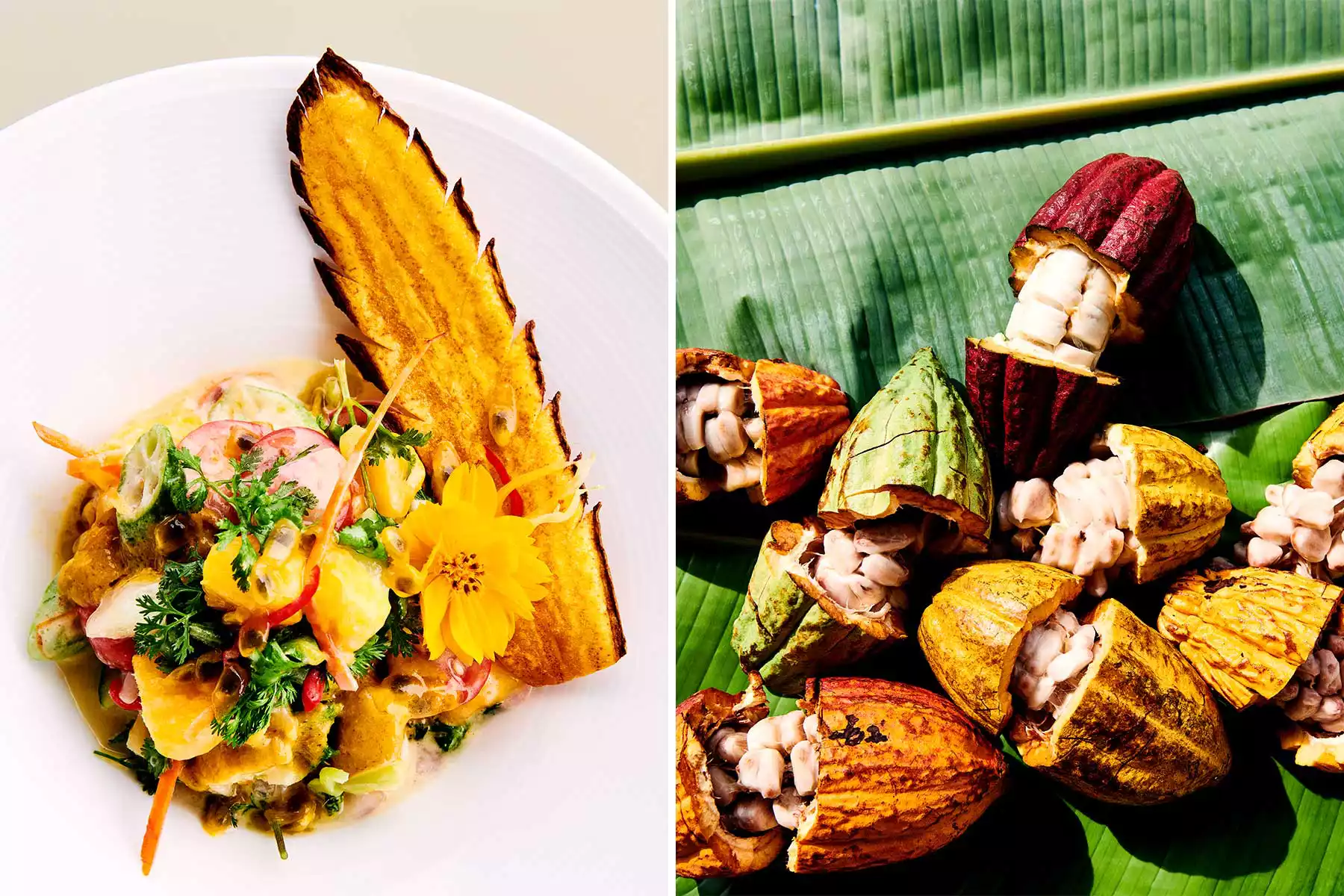1. Summary
Discover the culinary and cultural gems of St. Lucia, a Caribbean island known for its stunning natural beauty and rich food traditions. Explore how local farms and chefs are shaping the island’s dining experience, offering dishes that reflect its vibrant heritage.
St. Lucia: A Culinary Paradise
St. Lucia’s shimmering beaches and lush mountain peaks are known to be some of the most beautiful in the Caribbean. However, the island’s food and farming traditions have remained mostly out of the spotlight.
The Journey to Emerald Estate Farm
The 20-minute drive from Jade Mountain resort to its Emerald Estate Farm takes you through vibrant landscapes. Fuchsia bougainvillea and leafy palms sway in the wind along curvy, bumpy roads that coax even the most impatient driver to slow down. Fruit trees grace the yards of pastel-colored houses, while hummingbirds flit about, and locals move leisurely under the midday sun. Here, time is a gentle companion rather than a strict taskmaster.
Deferring to Nature’s Rhythms
Deferring to nature means that when the weather is clear, freshly harvested cocoa beans enjoy the sun; just before it rains, they are tucked away to ferment. When mangoes are ripe, they are enjoyed fresh or transformed into chutneys, jams, and juices. This reverence for natural cycles defines the dining experience in St. Lucia, where menus at resort restaurants have increasingly embraced local flavors and Creole dishes.
Awakening Taste Buds
If you have not explored the Caribbean’s culinary diversity, you might not distinguish between the island cuisines. Perhaps you’ve savored fresh fish or tropical fruits, but the subtleties of “Creole cooking” often elude visitors. St. Lucia’s culinary offerings extend beyond breathtaking vistas; they reflect the island’s Afrocentric heritage, as restaurants like those at Anse Chastanet and its sister property, Jade Mountain, celebrate locally sourced ingredients.
A Shift in Culinary Recognition
In recent years, culinary recognition has expanded in St. Lucia. More chefs from diverse backgrounds are acknowledged for their contributions to the culinary landscape. People are beginning to appreciate the island’s rich culinary heritage that extends far beyond the tourist track.
Cultural Milestones
Long before St. Lucia became a colonial outpost in 1651, it was home to ancient societies built by the Arawak and Carib Indians. The influx of enslaved Africans and indentured East Indian laborers has shaped the island’s cultural tapestry. Presently, as St. Lucia celebrates its independence since 1979, the focus shifts towards food and cultural identity.
Local Sourcing Challenges
For local businesses, alignments between food supply and tourist demand remain challenging. With more visitors than residents, food imports have become necessary. Optimizing communication among hoteliers, chefs, and farmers could reduce dependency on imports while boosting local economies and addressing poverty and food insecurity.
Experience Creole Cooking
Dining experiences in St. Lucia are not limited to just beautiful scenery or thrilling activities. When chefs trained in Creole cooking prepare meals that highlight local ingredients, visitors deepen their understanding of the island. Flaunt succulent dishes like roasted fish in citrusy souskaye, piping-hot accra fritters, or green fig and saltfish.
The Allure of St. Lucian Chocolate
Visitors may be pleasantly surprised by the significance of cacao in St. Lucian cuisine. The island is home to over 2,000 cacao trees, and chocolate produced here is a local treasure. At the Jade Mountain Chocolate Lab, visitors can participate in the artisan chocolate-making process and learn about the journey from bean to bar.
Cultural Insights from the Market
Strolling through Soufrière Market in the morning offers glimpses of local life. Here, vendors share fresh produce and regional specialties. Engaging with locals allows a taste of the vibrant culture that enriches the overall experience. One can appreciate cocoa tea, bakes, and many tropical fruits amidst the camaraderie of fellow community members.
A Taste of St. Lucia
Where to Stay
Anse Chastanet: This resort offers partially open-air accommodations designed to harness cool breezes while providing luxurious amenities. Alongside adventure sports, a vegan restaurant uses organic produce from Emerald Estate Farm.
Jade Mountain: Nestled on a hillside, this resort boasts stunning views and private infinity pools, perfectly positioned to appreciate the natural beauty of the Pitons.
Ladera Resort: Once a cocoa plantation, it now houses lush gardens and stone structures. The on-site restaurant, Dasheene, features a unique dining experience that marries St. Lucian and French culinary traditions.
What to Do
Emerald Estate Farm: This 40-acre organic farm produces a variety of fruits, herbs, and over 1,000 cocoa trees. Guided tours provide insight into sustainable farming practices.
Project Chocolat: Offering a “tree to bar” tour, this cocoa farm showcases hands-on demonstrations and a delightful walk through a tropical rainforest.
Soufrière Market: Open every day for local vendors selling tropical fruits and St. Lucian specialties, this market is a cultural hub every Saturday morning.
A version of this story first appeared in the September 2022 issue of GoTravelDaily under the headline “The Castaway.”





